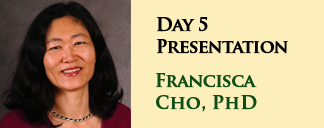Francisca Cho, PhD, Professor, Dept. of Theology, Georgetown University.
Western observers appreciate the way Buddhism’s non-theism allows relatively more harmony with science, but they also insist that its supernatural parts—particularly the ideas of karma and rebirth—should be eliminated or rehabilitated into metaphorical ethical concepts. This limit point in the encounter between Buddhist and modern scientific modes of thought is an opportunity to make the dialogue much deeper than it has been so far. Buddhist traditions appreciate the power of the human imagination to project social and cosmological worlds. When rationalists try to “save” Buddhism from its mythological heritage, they overlook the fact that their own naturalist cosmology can be theorized from the perspective of Buddhist epistemologies. The elimination of supernatural and teleological language is one way modern science got distinguished from natural theology, but scientific naturalism needs to be critically examined as well. The effort of theologians to do this—usually by distinguishing methodological from ontological naturalism—have had limited results. Buddhist tradition, on the other hand, is accepted as a “mind science” with its own empirical and logical bases. In addition to partnering with neuro-scientific studies, this mind science enables self-reflexive considerations of the nature, limits, and possibilities of the reigning dualist, subject-object scientific cosmology.
360 Video Login required
